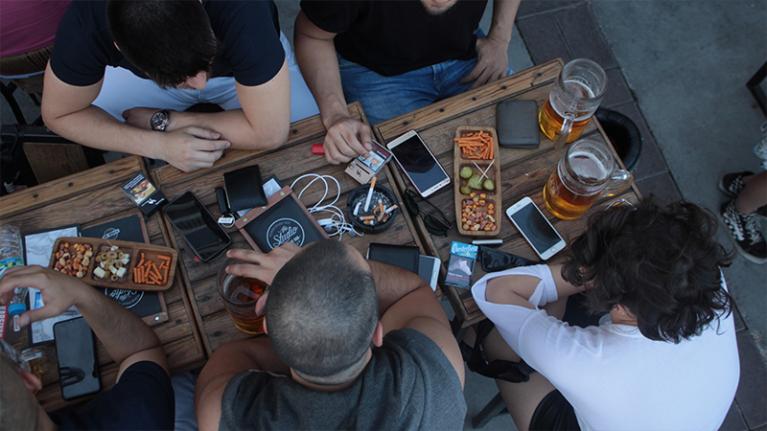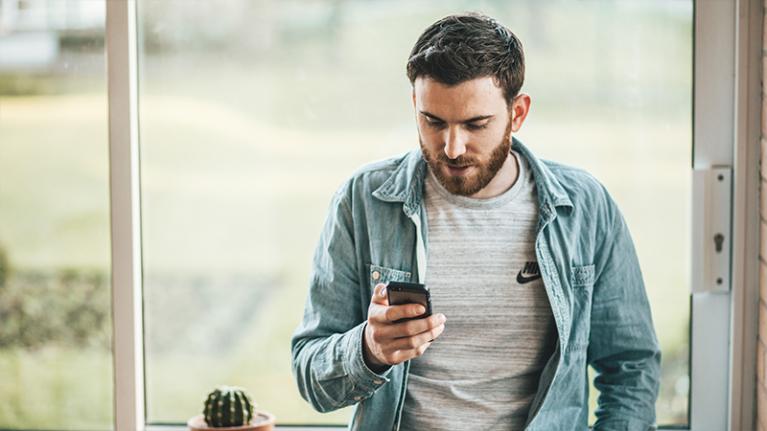Is my phone spying on me?
One minute you’re chatting to a friend over coffee about how you really need a yellow duck-bill shaped muzzle for your dog, because why not? Next minute, you open up Facebook to check on a notification and there – hovering in your newsfeed above Aunt Liz’s latest baking fail and a selfie-by-dad you’d rather not have seen – is a sponsored ad for a yellow duck-bill shaped dog muzzle.
The strange thing is, you didn’t even think such a thing existed, and you’ve certainly never searched online for it before. A shiver runs down your spine as you stare deep into your phone screen, whispering ‘can you see into my soul?’

The TLDR downlow
It’s 30% 'what the...?' and 70% creepy, and we’ve all been there. But is your phone really listening, watching and reacting to your every move? Or is something different, but nevertheless spooky, going on? And how can you protect yourself from the digital eyes and ears all around?
While your smart phone with its inbuilt microphone definitely has the capacity to listen to you and record content, and some apps definitely do exploit this capability, the short answer is no. Your phone is not listening to you, and neither is Facebook, the site most of the experiences of this phenomenon seem to be linked to (or so they say).
The long answer
So why then do so many synchronistic ads pop up on our socials? Even when the item is still just a passing thought in our mind, not one we've ever done online research about.
The answer lies with you and the information you inadvertently give out via your online behaviour and that of your social circle. You see, it's far more difficult to target ads via listening in to your conversations with friends than it is to just use the online data you've already generated about yourself.
Your phone isn't listening, because it doesn't need to. Via your online activity linked to your accounts, and consent to large organisations (such as social media companies), the following information about you may be available:
- who you are, your sex, age, marital status, pets and children
- where you live, work and other geographic locations you have visited
- all the websites you visit and have visited, the music you listen to, the TV shows you watch and the books you read
- the friends you interact with online and their friends – as well as all of their personal data as listed above.
Even if you believe you are keeping some of this information private, companies are able to deduce your probable profile via the details available on the people you interact with.
"People just don't realise how much personal information they are giving away online," says Adam Janik, VU Cybersecurity Influence Lead. "And unfortunately this can be misused – in malicious ways that go far beyond irritating advertisements, such as targeted scam emails containing viruses."

What can you do to protect yourself?
The good news is, there are a couple of ways you can control what kind of information is shared about you online and what data is made available to companies.
"At VU, our proactive cybersecurity awareness program, helps staff, students and the local community learn how to take control of their online safety. We offer hands-on information sessions, free antivirus software, multi-factor authentication and regular updates on safe browsing, scam emails and phishing – as well as essential hardware like cam covers," says Adam Janik.
Since last year, Facebook launched an option to turn off tracking, so that you can stop the app tracing your visits and activity on external websites. If you take this option, you may see a reduction in seemingly-spooky product placement.
If you have a Google account, you can log in and go to myactivity.google.com where all the information Google has about your online activity will be located and can be controlled by you.
Be careful about which apps you download and trust. Check the app permissions before you give over access, for example a calculator app doesn't need access to your contacts for any reason. And be aware that some apps may take screenshots to see how the app is being used.
You could also consider using a VPN (virtual private network) which can help to project your personal privacy online. However, while a VPN can potentially help hide identifiers such as your location, it can't stop Google from tracking your search history for example. Other options to consider are using a privacy conscious browser (such as Brave) or search engine (such as DuckDuckGo) that may give you the privacy and control you're seeking.

Cyber security
Concerned about your online security or want to make a career of catching online creeps?
Discover VU IT Services' on-campus proactive cybersecurity campaign and get tips on how to be aware of risks and protect yourself from potential attacks online.
Explore our game-changing courses in cybersecurity and find out how you can get tech-ready for this fast-growing industry:
